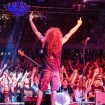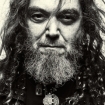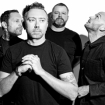Revolver has teamed with Nuclear Assault for an exclusive "Combat Camo" vinyl edition of their classic album, Game Over, limited to 200 copies worldwide. Order yours before they're gone!
When bassist Dan Lilker was thrown out of Anthrax in January of 1984, he didn't waste any time moaning about it. He simply called up his guitarist friend (and fellow Anthrax castaway) John Connelly and started a new band. Along with drummer Glenn Evans and guitarist Anthony Bramante, they formed Nuclear Assault — a band that would quickly become a cornerstone of NYC thrash. In true East Coast style, Nuclear Assault incorporated hardcore influences in a way that West Coast kingpins like Metallica, Megadeth and Slayer did not.
After debuting with the Brain Death EP in the summer of '86, the band dropped their first full-length, Game Over, just two months later. Released in the terrifying wake of the Chernobyl nuclear accident, the album boasted lethal rippers like "Radiation Sickness," "After the Holocaust" and "Nuclear War" — sheathed in appropriately apocalyptic Ed Repka cover art. But it wasn't all toxic fallout and end-times prophecy. Short hardcore shockers like "Hang the Pope" and "My America" provided some punk-rock levity — along with a cover of the theme from the Mr. Softee ice cream truck.
Revolver recently caught up with Lilker to get the stories behind Game Over. "Forgive me if I don't remember everything," he says with a laugh. "When I get asked about records that happened 35 years ago, some details can elude me."
YOU AND JOHN CONNELLY WERE COMING OUT OF ANTHRAX WHEN YOU STARTED NUCLEAR ASSAULT. DID YOU FEEL LIKE YOU HAD SOMETHING TO PROVE WITH THE NEW BAND?
DAN LILKER Well, John had only been in the very beginning of Anthrax, when we were kids playing church basements in 1981 — but yeah, that was the last band he'd been in. As far as something to prove? When I was "ejected" from Anthrax, I guess you could say, in January of '84, and I called up John in February to form Nuclear Assault, it wasn't done in a vengeful way, like, "I'm gonna get those motherfuckers!" It was more like clearing my name because I'd been thrown out of a band, like, "I didn't do anything wrong. Look, I can play this shit."
I mean, I did write most of the first [Anthrax] record, so I just wanted to prove that there was no reason for those guys to throw me out. Beyond that, I wanted to do something a little darker and faster — bring a little more Discharge and Hellhammer into it. So that's what happened.

YOU GUYS RELEASED THE BRAIN DEATH EP FIRST, BUT THAT WAS ONLY LIKE TWO MONTHS BEFORE GAME OVER. WHY WAS IT DONE THAT WAY?
Brain Death was done at the same session at Pyramid Sound [in Ithaca, NY] as the Game Over stuff. We just basically went in there in what would've been the spring of '86 and recorded a whole bunch of stuff: Everything on Game Over and a couple of extra things, which were "Final Flight" and "Demolition," which were used along with "Brain Death" — which was also on the album — as the teaser EP. So that was all one session.
WHY WAS THE SONG "BRAIN DEATH" INCLUDED ON BOTH RELEASES, AS OPPOSED TO ONE OF THE OTHER TRACKS? IT SEEMS LIKE AN ODD CHOICE, GIVEN THAT IT'S SEVEN MINUTES LONG.
I can't say I remember the thought process exactly, but I think we did that because "Brain Death" had the fast heavy stuff but it also had the melody in the middle, so I guess it was decided amongst the band and the label that it was a good song to introduce the band. But it was kinda strange to use a seven-minute song to introduce a thrash band that's influenced by hardcore. In retrospect, I'm not sure I would've picked that one right off the bat, but it worked out.
LET'S GO FROM THE LONGEST SONG ON GAME OVER TO ONE OF THE SHORTEST SONGS: WHAT'S THE STORY BEHIND "HANG THE POPE"?
Musically, we were listening to a lot of really fast hardcore, like the first D.R.I. album — plus stuff even noisier and nastier than that, like Capitalist Alienation or Siege. We were never like, "We can't do this or that because that wouldn't be thrash." We just thought it would be fun to have a super-fast hardcore song on there. Lyrically, it was just shock value. We're talking about a man who's loved by many Catholics and stringing him up on a rope, and we weren't taking it entirely seriously. But years later when I befriended all those Norwegian black metal people, they were all thumbs up about that one, let me tell ya.
THE SONG TITLE "VENGEANCE" IS MISSPELLED ON THE BACK OF THE ORIGINAL LP, AND YOU'RE LISTED AS DAN "LINKER" IN THE SONGWRITING CREDITS. WHOSE FAULT WAS THAT AND HOW ANNOYED BY IT WERE YOU?
Oh, there's a few fucking typos on there, man. You gotta remember it was much more of a process to release a record back then. It wasn't people at home using Pro Tools and programmed drums and then using Photoshop and Illustrator to do the layout with spellcheck built in. Back then, you had your art department at the label, and by the time that stuff would've been handed in, you'd have thought we all would've had a look at it and checked every little detail, but that didn't happen. And I don't remember why. But I do remember my reaction, which was "What the fuck? Didn't anybody notice that?" And then I thought, Did I notice that? [Laughs] So you have to write that off to "shit happens," just like the slightly anemic guitar tone on that record.
YEAH, LET'S TALK ABOUT THAT. GAME OVER PRODUCER ALEX PERIALAS WAS THE PREMIER THRASH ENGINEER AT THIS TIME — YOU'D ALREADY WORKED WITH HIM IN ANTHRAX AND S.O.D. — WHY DID HE LET THAT SLIDE?
Well, John and Alex worked on the guitar tones together. When it was time to track the rhythm guitars, the rest of us went out for the day in Ithaca. We went to the batting cages and then got some pizza and beer somewhere. When we came back and heard them recording with that guitar tone, I was like, "That sounds a little too clean and chintzy." And they got a bit defensive, like, "You guys went out when we worked on the guitar tone."
It would've been a big to-do at that point, both in terms of studio budget and hurting people's feelings, to start over with more distortion. So we shrugged and went with it. I think it sounds like the volume on the guitar itself — not the amp — was on six instead of ten, but years later people like Nocturno Culto from Darkthrone have told me that's what gives the album character.

WHY DID YOU RECORD THE MR. SOFTEE THEME? IT'S OBVIOUSLY SUCH A NEW YORK THING, BUT IT'S ALSO AN ICE CREAM JINGLE.
I really have no idea. I think that might've been one of John's ideas — he usually had the goofier ideas. But maybe doing little things like that now and then showed that we had a sense of humor and it wasn't all completely serious. When you looked at bands like Slayer or Dark Angel, as people they were goofballs just like everyone else, but they had a very serious lyrical approach. I think we wanted to be something different. I might've resisted the idea to record that, but if I did I was outvoted. It's okay to have that balance, though.
It maybe didn't occur to us that not everyone would know what Mr. Softee was, seeing as how it's such a regional thing. But of course, we realized that someone in, say, Germany, would have no idea. And this was before Google, so it remained a mystery to many people for years — just like the song "My America." People might've mistakenly thought we were arch right-wing conservatives because we made a song about Communist slobs, but we were just making fun of a column in a fictional supermarket tabloid.
THE SONG "LESBIANS" IS ON THE CASSETTE VERSION OF THE ALBUM, BUT NOT THE LP. WHAT'S THE STORY THERE?
To have an extra track in those days, you'd put it on a different format. CDs were just coming out at this point, so that song made the cassette unique. As far as its musical content, it was the same thing as "Hang the Pope" — we just wanted to have some wild, fast hardcore. Of course the lyrical content is a little more complicated. We came from a generation where shock value was appreciated more. Nobody was a homophobe, obviously — it was more like the S.O.D. humor, where we were just trying to be as obnoxious as possible. That's hard to understand now, I realize that, but it's not a serious song and we didn't mean it.
DO YOU HAVE A FAVORITE SONG ON THE RECORD?
I'd say "Radiation Sickness" just because it's such a fucking savage, four-chord song. It never slows down — it's relentless. It's like prototypical black-thrash if you think about it. It's not a very fun song lyrically, of course, but you have to remember that this was the era of Chernobyl, too. And if you're gonna have a song about people's skin falling off, then you should have some pretty rabid music under it. So I think that song encapsulates what I like about the early Nuclear stuff — just that raw, go-for-it, fist in the fucking face, nonstop ugly. And I think that was an East Coast thing. Bands like Testament maybe had more shredding and a little more musicality, but we were known for having hardcore influences, and that song kinda summed that up.

ED REPKA'S COVER ART FOR GAME OVER IS FANTASTIC. DID YOU GUYS GIVE HIM ANY DIRECTION?
I might not have been involved in the art direction as much, but we would've told him that we wanted an album cover that looks like a nuclear holocaust disaster and how people would react to that. So that moment he captured would've been right before everyone's skin falls off, I guess. We just wanted something that looked apocalyptic and horrible that matches the lyrics. It's killer.

DO YOU THINK OF GAME OVER DIFFERENTLY TODAY THAN YOU DID IN '86?
Yes and no. I got over worrying about the guitar sound a long time ago, but I was really proud of that record when it came out and I'm really proud of it now. It's like a parent unfairly liking their first kid the most — and I say that as a father of cats. So it'll always have a place in my heart.
Below, watch Dan Lilker and Nuclear Assault perform the classic Game Over track "Betrayal" on November 11th, 2018, in Brooklyn, New York.












